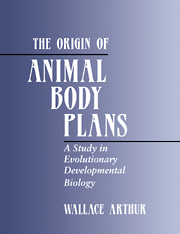Book contents
- Frontmatter
- Contents
- Preface
- Preface to the Paperback Edition
- 1 INTRODUCTION
- 2 WHAT IS A BODY PLAN?
- 3 PATTERNS OF BODY PLAN ORIGINS
- 4 EVOLUTIONARY DEVELOPMENTAL BIOLOGY
- 5 DEVELOPMENTAL MECHANISMS: CELLS AND SIGNALS
- 6 DEVELOPMENTAL MECHANISMS: GENES
- 7 COMPARATIVE DEVELOPMENTAL GENETICS
- 8 GENE DUPLICATION AND MUTATION
- 9 THE SPREAD OF VARIANT ONTOGENIES IN POPULATIONS
- 10 CREATION VERSUS DESTRUCTION
- 11 ONTOGENY AND PHYLOGENY REVISITED
- 12 PROSPECT: EXPANDING THE SYNTHESIS
- References
- Index
12 - PROSPECT: EXPANDING THE SYNTHESIS
Published online by Cambridge University Press: 05 June 2012
- Frontmatter
- Contents
- Preface
- Preface to the Paperback Edition
- 1 INTRODUCTION
- 2 WHAT IS A BODY PLAN?
- 3 PATTERNS OF BODY PLAN ORIGINS
- 4 EVOLUTIONARY DEVELOPMENTAL BIOLOGY
- 5 DEVELOPMENTAL MECHANISMS: CELLS AND SIGNALS
- 6 DEVELOPMENTAL MECHANISMS: GENES
- 7 COMPARATIVE DEVELOPMENTAL GENETICS
- 8 GENE DUPLICATION AND MUTATION
- 9 THE SPREAD OF VARIANT ONTOGENIES IN POPULATIONS
- 10 CREATION VERSUS DESTRUCTION
- 11 ONTOGENY AND PHYLOGENY REVISITED
- 12 PROSPECT: EXPANDING THE SYNTHESIS
- References
- Index
Summary
Neither Boredom nor Heresy
Scientific theories, or interconnected groups of them, are often likened to buildings – as in the phrase ‘theoretical edifice’. There is a lot of sense in this analogy. General theories are often built up painstakingly from many different components. They are underpinned by various ‘foundations’. Different parts of a theoretical edifice are often interdependent – if one part turns out to be wrong, the whole structure may eventually collapse.
We can picture neo-Darwinian evolutionary theory, or the ‘modern synthesis’, as one particular theoretical edifice. In this context, criticisms of the theory tend to be reacted to in a bimodal way. When a mild-mannered critic points out that the theory is fine as far as it goes, but that it lacks a developmental component (e.g. Horder 1994), a reaction verging on boredom is sometimes engendered: something along the lines of ‘yes, a few bricks are missing, but they will eventually be discovered and inserted’. In contrast, more damning criticism, which implies that the whole edifice needs to be demolished and replaced with a different one with greater explanatory power (e.g. Rosen 1984), is rightly regarded as ‘heresy’.
It should by now be apparent that the view of existing evolutionary theory taken herein constitutes a criticism of intermediate scale. There is not just a brick or two missing, but rather a whole section of the building.
- Type
- Chapter
- Information
- The Origin of Animal Body PlansA Study in Evolutionary Developmental Biology, pp. 285 - 296Publisher: Cambridge University PressPrint publication year: 1997



